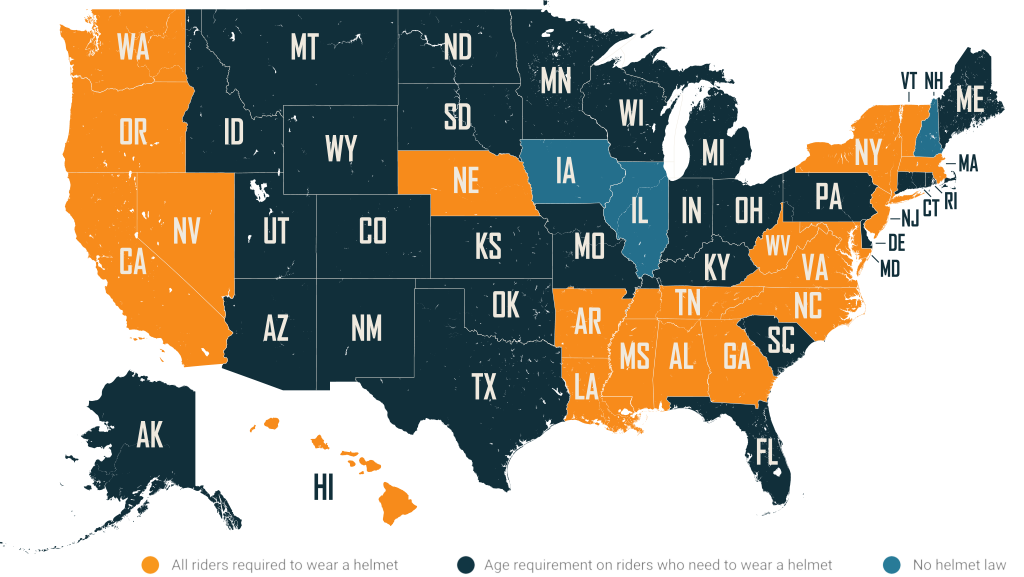States with Helmet Laws

States with Universal Helmet Laws
Universal helmet laws require all motorcycle riders to wear helmets, regardless of their age or riding experience. Currently, there are 19 states and the District of Columbia that have universal helmet laws. These states include:
- Alabama
- California
- Georgia
- Louisiana
- Maine
- Maryland
- Massachusetts
- Michigan
- Mississippi
- Missouri
- Nebraska
- Nevada
- New Jersey
- New York
- North Carolina
- Oregon
- Tennessee
- Vermont
- Virginia
- Washington
- District of Columbia
Why Universal Helmet Laws Are Important
Universal helmet laws have been shown to save lives and reduce the severity of injuries in motorcycle accidents. According to the National Highway Traffic Safety Administration (NHTSA), helmets saved an estimated 1,872 lives in 2017 alone. In states with universal helmet laws, the number of motorcycle fatalities is lower compared to states without such laws.
The Cost of Not Wearing a Helmet
Not wearing a helmet can have serious consequences. In addition to the risk of injury or death in a motorcycle accident, riders who do not wear helmets may face fines and legal penalties. In some cases, they may also be denied insurance coverage for injuries sustained in an accident.
States with Partial Helmet Laws
Partial helmet laws require only certain riders to wear helmets, such as those who are under a certain age or have a certain level of riding experience. Currently, there are 28 states that have partial helmet laws. These states include:
- Alaska
- Arizona
- Arkansas
- Colorado
- Connecticut
- Delaware
- Florida
- Hawaii
- Idaho
- Indiana
- Iowa
- Kansas
- Kentucky
- Minnesota
- Montana
- Nebraska
- New Mexico
- North Dakota
- Ohio
- Oklahoma
- Pennsylvania
- Rhode Island
- South Carolina
- South Dakota
- Texas
- Utah
- West Virginia
- Wisconsin
- Wyoming
Why Partial Helmet Laws Can Be Problematic
Partial helmet laws have been criticized for not providing enough protection for riders. Riders who are not required to wear helmets may suffer serious injuries or even death in a motorcycle accident. Furthermore, partial helmet laws can be difficult to enforce, as it may be unclear who is required to wear a helmet and who is not.
States with No Helmet Laws
Currently, there are three states that have no helmet laws. These states include:
- Illinois
- Iowa
- New Hampshire
The Risks of Riding Without a Helmet
Riding without a helmet is extremely dangerous. In a motorcycle accident, riders who are not wearing helmets are much more likely to suffer serious injuries or even death. Furthermore, riders who do not wear helmets may face fines and legal penalties in some states.
Advantages and Disadvantages of Helmet Laws
Advantages of Helmet Laws
- Reduce the risk of head injuries and fatalities in motorcycle accidents.
- Protect riders from legal penalties and fines for not wearing helmets.
- Encourage safe riding practices.
Disadvantages of Helmet Laws
- May be seen as an infringement on personal freedom.
- Can be difficult to enforce, especially in states with partial helmet laws.
- May not be effective in reducing motorcycle fatalities in all cases.
Conclusion
Helmet laws play an important role in motorcycle safety. Riders who wear helmets are less likely to suffer serious injuries or death in a motorcycle accident. While universal helmet laws provide the most protection for riders, partial helmet laws and states without helmet laws still require riders to take responsibility for their own safety. Regardless of the law in your state, wearing a helmet is the smart and safe choice when riding a motorcycle.
FAQ
Q: Do helmet laws really make a difference?
A: Yes, helmet laws have been shown to reduce the number of motorcycle fatalities and injuries in states with universal helmet laws.
Q: Why do some states not have helmet laws?
A: Some states do not have helmet laws due to political and personal freedom issues.
Q: What should I look for when buying a motorcycle helmet?
A: Look for a helmet that meets the safety standards set by the Department of Transportation (DOT) or Snell Memorial Foundation.
Q: Do I have to wear a helmet if I ride a motorcycle?
A: It depends on the law in your state. Some states require all riders to wear helmets, while others only require certain riders to wear them.
